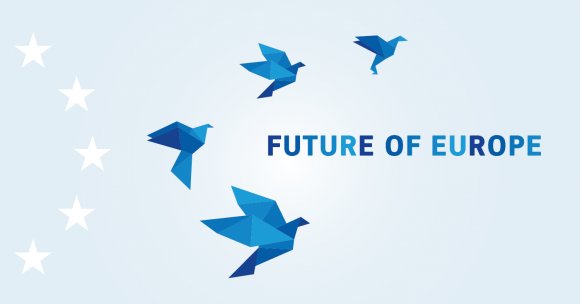Do we need Treaty changes?
The Lisbon Treaty entered into force more than a decade ago and many request a renewal to adapt the institutions and EU competences to the challenges ahead. There was, however, some discussion regarding whether this would be an intelligent move.
Brando Benifei: “The European Parliament will have the boldness to push the Council in the right direction”
On the one hand, most participants wished for Treaty changes. For instance, Brando Benifei MEP, S&D, President of the federalist Spinelli Group at the European Parliament, deplored that the EU did not have the instruments it needed in the pandemic. He called for a health union from the EU’s own resources, to limit unanimity in the Council and to establish the common debts as a permanent mechanism to increase the EU’s Multi-annual Financial Framework.
Federica Mogherini: “I am as federalist as you are”
On the other hand, Federica Mogherini, Rector of the College of Europe and former High Representative of the Union for Foreign Affairs and Security Policy and Vice-President of the EU Commission, questioned the calls for Treaty changes. Citing the developments in the field of defence as an example, she affirmed that more progress towards a closer union is possible without Treaty changes and warned that opening up the Treaties in these times of instability could instead lead to a loosening of the ties, not a deepening of the Union.
How to attract and include civil society in the conference?
Another pressing question regarding the planned Conference on the Future of Europe is how to include civil society in the debate. If this conference is to be the big new input for the future of Europe, it is indispensable that everyone can make their voice heard.
Danuta Hübner: “I dream of a permanent mechanism of citizens’ engagement in the decision-making”
Danuta Hübner MEP, former Chair of the European Parliament Constitutional Affairs Committee, showed herself surprisingly optimistic about the possibility of including all citizens in the debate, even the less educated and in rural areas. She mentioned how active young people were already and pointed to new possibilities of participation through digital tools. She emphasized however the pre-condition to give young people the space to express themselves and the assurance that they are really listened to.
Kalypso Nicolaïdis: “Democracy is about losing control”
Prof. Kalypso Nicolaïdis, the renowned Professor of International Relations at the University of Oxford and Chair in International Affairs at the School of Transnational Governance at the European University Institute in Florence, also advocated for a strong involvement of civil society in the Conference. She expects “no less than the third democratic revolution“. She called for European peoples to connect among themselves over national borders and over generations. According to her, the history of democracy was one of resistance of the elites from losing control, but democracy is about losing control. We should not focus too much on Treaty changes and institutions, but more on our democratic mindset. The citizens’ involvement in the Conference should be considered a “test case” for a permanent citizen participation.
Heribert Hirte: “We need strong parliamentarians”
The only panellist seriously questioning the optimistic remarks about citizens’ engagement was Heribert Hirte MP, Chair of the German Bundestag Sub-Committee on European Union Law. He emphasized the importance of national parliaments. Since the national deputies are elected to represent the citizens, he cautioned against the lack of transparency of civil society engagement – who represents whom? Who is paid for to speak for whose interests?
Although Mr Hirte’s doubts are to be taken seriously, I agree with the point that all citizens should be enabled to make their voices heard. This would require a huge publicity effort, which I do not believe the Council is willing to undertake. Furthermore, Prof Nicolaïdis pointed out another issue: The institutions don’t speak “the language” of the people. It is true; bureaucratic and legal terms are incomprehensible for the majority of citizens.
I recall the Grand Débat National in France, called for by President Macron in 2019 as a response to the Yellow vests movement. Everywhere in France, even in small villages, discussion rounds (like townhall meetings) were organized around four topics. It was a massive effort of politicians and citizens alike.
It is this kind of engagement that is needed to give everyone in the society their voice. Ms Hübner’s optimism and belief in the youth and digital tools was heart-warming, but seems unlikely to be followed up on.
The question of follow-up?
There we arrive at the next big question and which was also stressed by Prof Nicolaïdis: What is the follow-up on citizens’ ideas going to be? For the moment, Member States do not seem enthusiastic about the idea of meaningful changes. If, however, the ideas voiced during the conference are not seriously taken up, it will lead to even more frustration and distancing of citizens from the European project.
Are there reasons for optimism?
While most speakers expressed optimism or hope for the Conference and its outcomes, I am not so sure this optimism is well-founded. It is the Member States who keep control in the EU, and they do not show any hopeful signs. Given the little to no communication to citizens about this Conference, many may never have heard of it. The question of the follow-up aside, the stalemate between the institutions about the presidency also paints a dark picture of Member States’ willingness to allow meaningful changes. I am of the opinion that the president position is relatively unimportant and should, at most, function as a broker between EU institutions. While plans for a tripartite presidency may end the deadlock, the success of the Conference would then depend on how well the coordination between the three presidents works out. I am left with the impression that Member States are not enthusiastic about this Conference; but what is it worth without their backing?

Follow the comments: |
|
